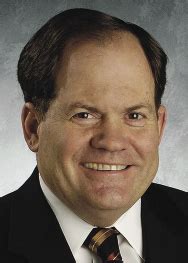A Quote by George W. Bush
I appreciate that question because I, in the state of Texas, had heard a lot of discussion about a faith-based initiative eroding the important bridge between church and state.
Related Quotes
Thanks in large measure to the ACLU, the belief that there is a wall of separation between faith and state, not just church and state, is endemic. The exercise of religious faith in the public square is not prohibited; only the federal imposition of a particular faith. Hardly anyone any longer knows the difference.
It is true that traditional Christianity is losing some of its appeal among Americans, but that is a religious, not political, matter. It is worth remembering that the Jeffersonian 'wall of separation' between church and state has always been intended to protect the church from the state as much as the state from the church.
Everyone in the United States is so intense about maintaining a separation between Church and State when the real concern should be about keeping a separation between Corporations and State--because in America (and most of the rest of the Western World, for that matter) economics is the real religion.
The idea of separating church and state by the Founding Fathers of America was freedom from the domination of one form of religion, because many of them left England, because they were persecuted by the church, because they want to express their Christian faith in a different way. So it was a bit of warfare between Christians.
State Farm is pleased to support the Common Core State Standards Initiative. State by State adoption of these standards is an important step towards maintaining our country s competitive edge. With a skilled and prepared workforce, the business community will be better prepared to face the challenges of the international marketplace.
The decision for complete religious freedom and for separation of church and state in the eyes of the rest of the world was perhaps the most important decision reached in the New World. Everywhere in the western world of the 18th century, church and state were one; and everywhere the state maintained an established church and tried to force conformity to its dogma.
































